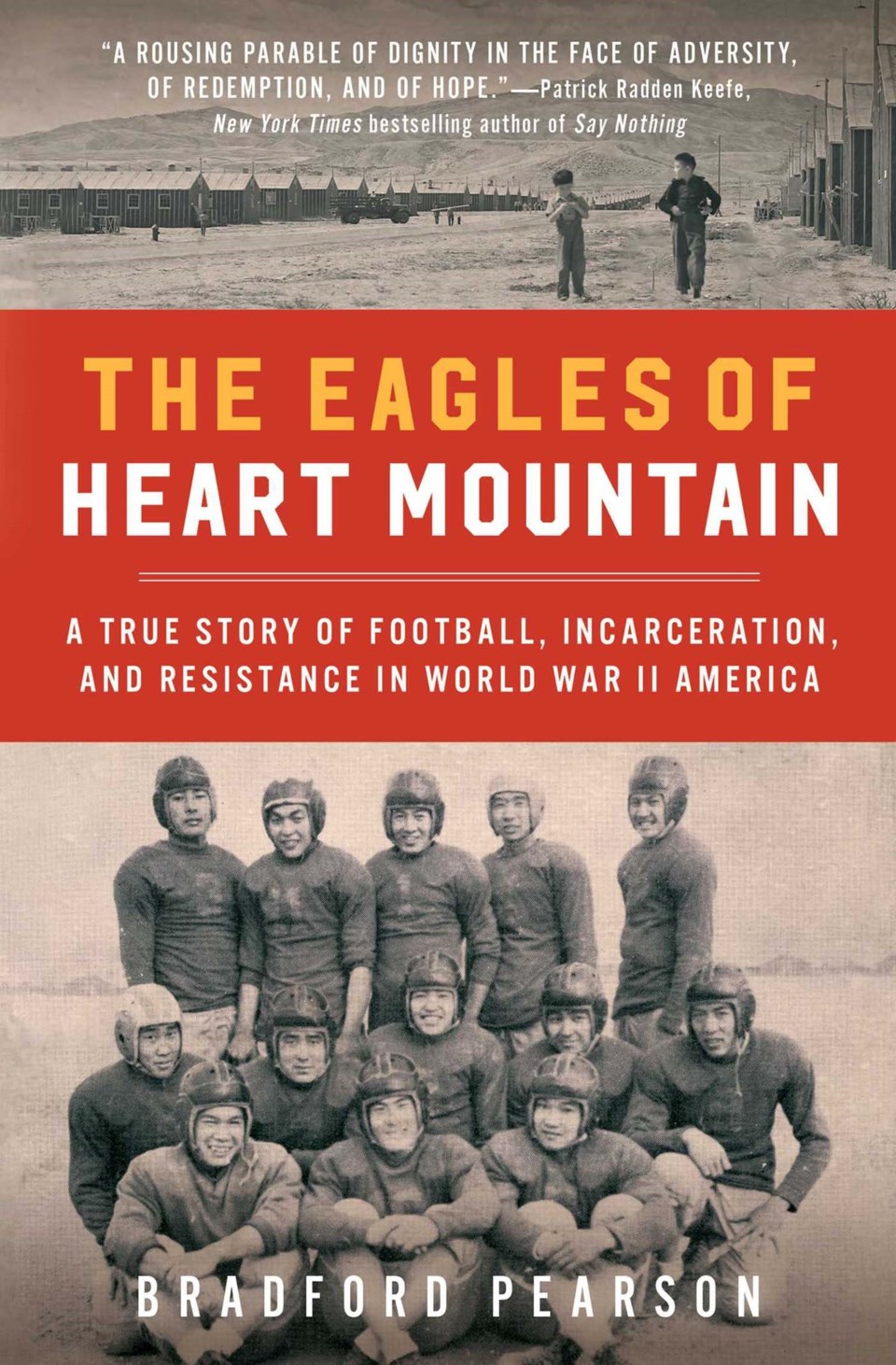If I head upstairs, I have a book shelf that has now spilled over to include a growing pile on the floor beside the shelf unit of sports most of the type noted above.
But on occasion a sports book comes along that is about more than winning and losing at a particular type of game.
The Eagles of Heart Mountain: A True Story of Football, Incarceration, and Resistance in World War II America by Bradford Pearson recently arrived and while the cover suggests it is a book about football, as the title indicates this is a book about a rather dark episode in American history.
“In the spring of 1942, the United States government forced 120,000 Japanese Americans from their homes in California, Oregon, Washington, and Arizona and sent them to incarceration camps across the West. Nearly 14,000 of them landed on the outskirts of Cody, Wyoming, at the base of Heart Mountain,” details www.simonandschuster.com
It was a dark time for the internees but somehow they persevered.
“Behind barbed wire fences, they faced racism, cruelty, and frozen winters. Trying to recreate comforts from home, many established Buddhist temples and sumo wrestling pits. Kabuki performances drew hundreds of spectators—yet there was little hope.
“That is, until the fall of 1943, when the camp’s high school football team, the Eagles, started its first season and finished it undefeated, crushing the competition from nearby, predominantly white high schools. Amid all this excitement, American politics continued to disrupt their lives as the federal government drafted men from the camps for the front lines—including some of the Eagles. As the team’s second season kicked off, the young men faced a choice to either join the Army or resist the draft. Teammates were divided, and some were jailed for their decisions.”
What Pearson has created is a rather stark political history of what happened to Japanese Americans; a story of racism and greed and fear on the part of white American, from president Roosevelt to the average citizen.
But through the darkness of the book there is a thread of light relating to the football team.
“I actually came to the story through the football team,” explained Pearson in a recent telephone interview.
It was in 2014 when the author noted he “came across the story of the Eagles,” when he saw “a couple of short sentences” on a plaque at a museum at the Heart Mountain site.
“I kept thinking about this story and the Eagles for years,” he said.
When he found digital copies of the Heart Mountain Sentinel newspaper he had the resource to start writing.
Pearson said he quickly realized the story was more than a magazine article, and more than about football. He said he knew it was an opportunity to introduce readers to the football players but then “to hang all the different histories and stories off them.”
It is a storyline which sadly parallels what occurred in Canada too.
And even the subtext of sport being a key diversion played out in this side of the 49th parallel, except it was baseball.
The Canadian story is told by a National Film Board documentary; ‘Sleeping Tigers: The Asahi Baseball Story’, which was a one-time entrant in the Yorkton Film Festival.
The 2003 documentary tells the story of the Asahi baseball team.
“In pre-World War II Vancouver, the team was unbeatable, winning the Pacific Northwest Championship for five straight years. After the Japanese attack on Pearl Harbor, all persons of Japanese descent in Canada were sent to internment camps. The former Asahi members survived by playing ball. Their passion was contagious and soon other players joined in, among them RCMP officials and local townspeople. As a result, the games helped break down racial and cultural barriers. This remarkable story is told with a combination of archival footage, interviews and dramatic re-enactments,” noted the NFB website.
Considering that we are now in the midst of events marking Remembrance Day – remembering those who died for our freedoms, both the book and the film are worth seeking out as tales of how easily those freedoms can be trampled. They are warnings from our not so distant past of how we can succumb to panic, greed and hate.
Pearson noted the disappointing and scary aspect to come out of researching and writing the book is that persecution of one minority or another continues.
The record keeps playing in the United Stated now with a new group unjustly persecuted, he said, adding the reason is always the same “because they’re not white.”
Pearson also noted when he was working on the book as far back as 2016 he’d tell someone of his work and they’d mention how it reflected what was happening ‘now’ but the ‘now’ kept changing.
One year it was then President Donald Trump’s immigration ban on people from certain countries, then it was the splitting of families of those being detained for allegedly entering the country illegally and then the violence against Chinse Americans over COVID-19.
Pearson said he worries that the story of American Japanese interment could too easily be repeated today.
“It unsettles me almost every day of my life. . . I’d be lying if I didn’t think it could happen again in the U.S.,” he said, adding when writing the book “. . . It felt very current quite frankly.”
That made the book a trying one to write at times as the author reflected on the realities that existed then and now.
“It’s a depressing topic to write about,” he said, adding that was why the football thread was so important as it gave “some humanity and heart” to the book, which he added “was really important to me.”





